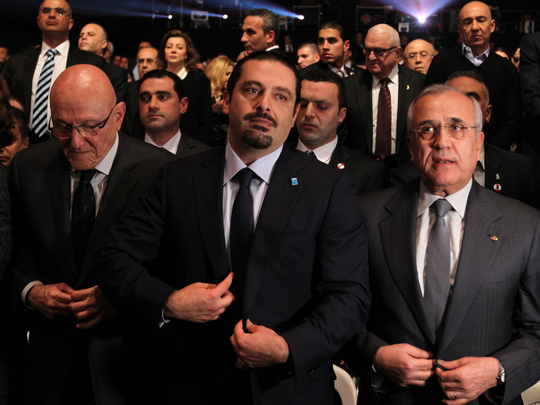
Beirut: Speaker Nabih Berri held a banquet on Friday evening in honour of Sa’ad Hariri whose full week in Beirut set a new record even if his safety was not fully guaranteed. Although the meeting between the two political leaders at Berri’s residence in Ain Al Tineh was restricted to Hariri’s adviser Nader Hariri and Berri’s political aide Finance Minister Ali Hassan Khalil, it was significant in more ways than many imagined, because it occurred at the end of a long week during which dozens of meetings were held to set the record straight. At the very least, Hariri’s presence highlighted his indispensable role in moving political markers and, perhaps, restart deliberations among the elite.
To be sure, few were privy to the Hariri-Berri discussions though similar meetings with other leaders focused on the stumbling blocks that prevented the election of a president for the republic.
On Wednesday, Hariri hosted Free Patriotic Movement (FPM) head Michel Aoun, to go over various intricacies that were raised and debated during dialogue sessions between Future and Hezbollah on one hand and between the FPM and the Lebanese Forces on the other. No one discussed what the two men may have agreed on or whether pledges were made to alleviate internal divisions.
Through the week, Hariri met up with most of the March 14 alliance members, sharing strategies on the ongoing dialogue between Future and Hezbollah. There seemed to be unanimity that the first four sessions lowered sectarian tensions given the hope that the positive atmosphere generated by face-to-face contacts would eventually lead to practical solutions to manage the country’s pending affairs.
For his part, the former premier reiterated to all interlocutors his support of the besieged Tammam Salam government that, for all practical purposes, is locked in a catch-22 — since all decisions require unanimity that, on significant matters, has been nullified by a single veto. “There are no substitutes to the government,” the former premier reiterated, even if his calls fell on deaf ears where it really mattered — with Hezbollah.
It was interesting to note that the only public exchange between Hariri and Hezbollah chief Hassan Nasrallah occurred during the two men’s respective presentations. During events to mark the 10th anniversary of his father’s assassination on February 14, Hariri called on Hezbollah to withdraw its troops from Syria, while Nasrallah invited Hariri and all Lebanese to go to Syria to fight the “serious and real” threat terrorism poses to the entire region.
On Monday, Nasrallah displayed an acute sense of humour when he declared: “Let us go together to Syria and Iraq and to any place that contains a threat to the future of our nation, because that is the right way to defend Lebanon.”
Equally important is that Nasrallah revealed for the first time that his militiamen were fighting in Iraq, what was presumptuous on his part was the assumption that five million Lebanese agreed on the matter or that most were ready to fight alongside the Ba’ath regime in Damascus.
In his own speech, Hariri had described Nasrallah’s recent remarks on “linking the Golan and the South fronts” and Hezbollah’s presence in Syria as “madness,” a theme he reverted to during his other discussions through the course of week and which, naturally, further highlighted the sharp differences that exist between the March 14 and March 8 alliances.
Notwithstanding his many consultations, the more noteworthy encounter was the one between Hariri and Aoun last Wednesday, ironically the general’s 80th birthday. Paradoxically, the day also marked the 19th attempt to ensure a parliamentary quorum to elect a new head-of-state that, once again, failed.
Many Lebanese were giddy to have Hariri back in the country, though they also wondered why elected officials could not drive the short distance to Nejmeh Square, where the parliament building is located, to conduct the business of the state — instead of merely holding banquets to honour each other.












